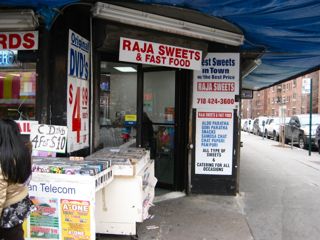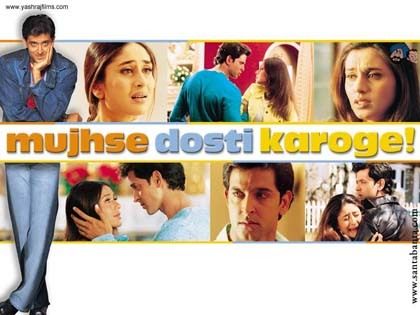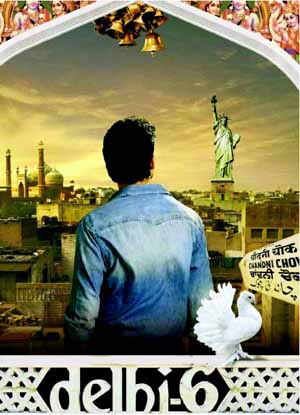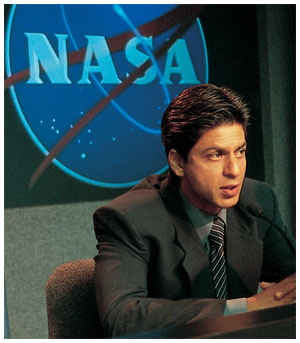From The Peopling of New York City
Hindi Cinema is the largest film industry in the world with the most prolific rate of production - a staggering 800 films a year - screened for approximately fifteen million people a day. It is the dominant cultural institution and product in India... - Jyotika Virdi, Cinematic ImagiNation''
The Music Industry - How it is present in Jackson Heights
Indian films have long been known for their "formulaic story lines, expertly choreographed fight scenes, spectacular song-and-dance routines, emotion-charged melodrama, and larger-than-life heroes." Drawing influences from ancient Indian epics of Mahabharata and Ramayana as well as Hollywood, the industry's success is due, in part, to its large base of Indian viewers. In Jackson Heights, a place with a large population of Indian immigrants, one can see DVD stores or vendors on virtually ever street. Some restaurants like the "Raja Music House" even sell Indian movies despite the fact that their primary business is food. Even non-Indians have heard of "Bollywood" or can call to mind an elaborate Indian dance number suggesting that the Indian Cinema Industry has permeated every corner of America. Why is its influence so rampant?
Film Content - A Mirror for Indian Culture and Values
Indians young and old love watching Indian films. They love the music, the dancing and perhaps on some level, they love being drawn into a world where real life problems resolve themselves in idealistic ways. According to Cashmira Shah, an Indian immigrant from Bombay, Indian films have an uncanny knack to portray her culture, values and identity quite accurately. The idea of family, she said, is very important to Indians and consequently very prominent in Indian films. In the movie Dil to Pagal Hai (The Heart is Crazy), Pooja the main character is torn between marrying the man she loves Rahul, or marrying Ajay whose parents adopted her when she was an orphaned child. Pooja feels that it is her duty to marry Ajay after all his parents have done for her. Pooja's dilemma touches upon the larger question of love versus arrangement in marriage which many Indian films grapple with. However, I was surprised to find that even though such a large emphasis was placed on family, in movies, the characters usually gave way to following their hearts in the end. I asked Mrs. Shah whether that was accurate of the way things would unfold in a typical Indian family and she said that the first duty of an Indian is to regard the feelings and well-being of others before yourself. In the case of the movies, particularly in Dil to Pagal hai, Pooja did not marry Rahul until Ajay gave his approval.
Similarly in Mujhse Dosti Karoge! (Will You be my Friend?), the main character, also named Pooja, would not consent to marry Raj because of her friendship with Tina whose father promised her to Raj; it is only after Tina realizes Pooja and Raj's love and tells Pooja to marry him that she does so. It can be surmised that in this business of marriage, friendship and family come before love.
Transnationalism - As explored in movies
A new wave of Indian Films reflects the plight of the Indian immigrant population. The second generation for example, are taught by their parents their culture. When I asked Mrs. Shah whether the younger generation still watches Indian film she replied, "they love it . . . we teach them when they are watching the movies. . . [it's] how they learn about our culture." The culture that is taught through movies is still very much present, but teenagers living in America also find it hard to identify with just one culture. While they might enjoy American customs, they still have a bond to India, their mother country. In the movie Dehli 6, Roshan brings his grandmother back to India, as her last wish before she died was to see India once more. Although he is American born, he soon is captured by India's sense of community, its people and ways.
Below is a video clip of the song "Yeh Jo Des Hai Tera" which Mohan sings at the end of the movie; the lyrics speak of how India will always be your motherland, you have to it "a bond which can never break."
Yeh Jo Des Hai Tera - Swades
This country of yours is your motherland
And is calling out to you
This is a bond which can never break
How can you forget the scent of your earth
You can go anywhere but you'll always come back
In new paths, in every sigh
To your lost heart
Someone will say
This land of yours is your motherland
Life is telling you
You have achieved everything now what's left
Looks like happiness has been showered on you
But you're far from your home
Now come back oh crazy one
Where at least someone will call you their own
And will call out to you
That very same country
This land that is yours..
This moment has hidden in it
A whole century of life
Don't ask why, in the road
Has come a fork with two ways
You are the one who should choose the path
You should choose which direction to take
This very country
This country of yours is your motherland.
By Karen Lin



